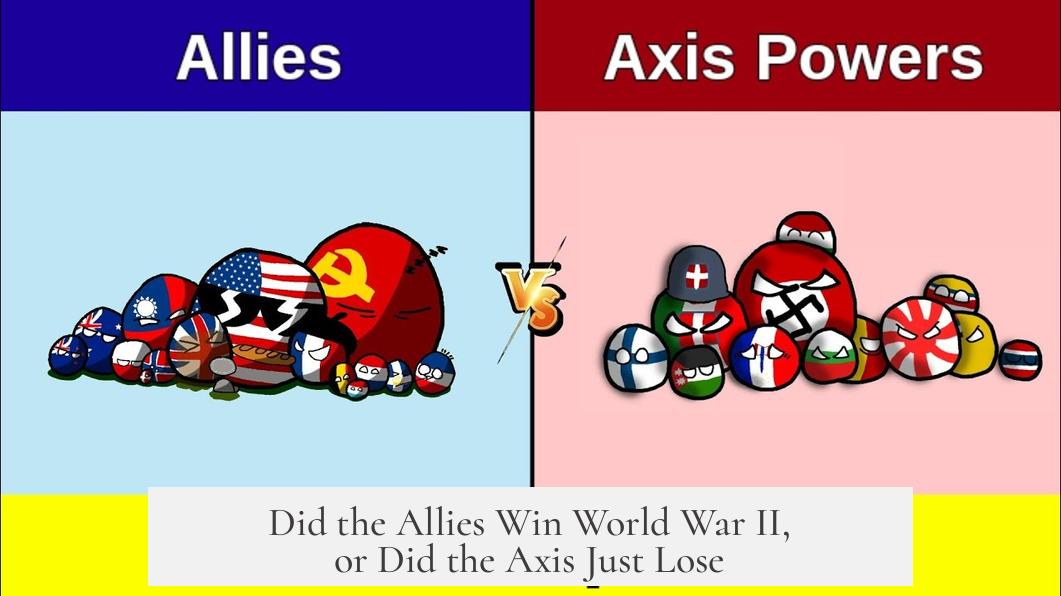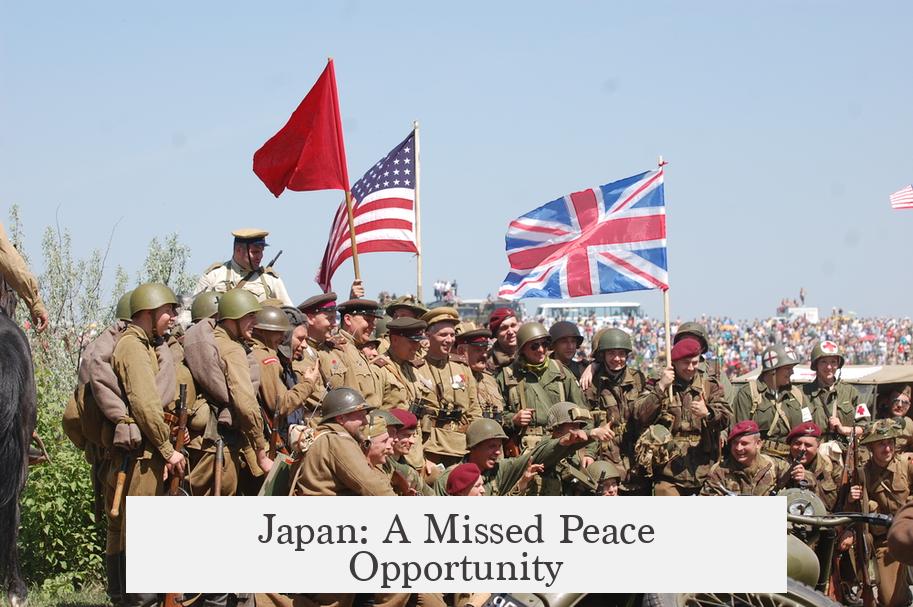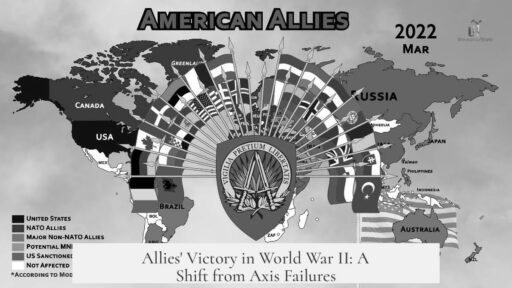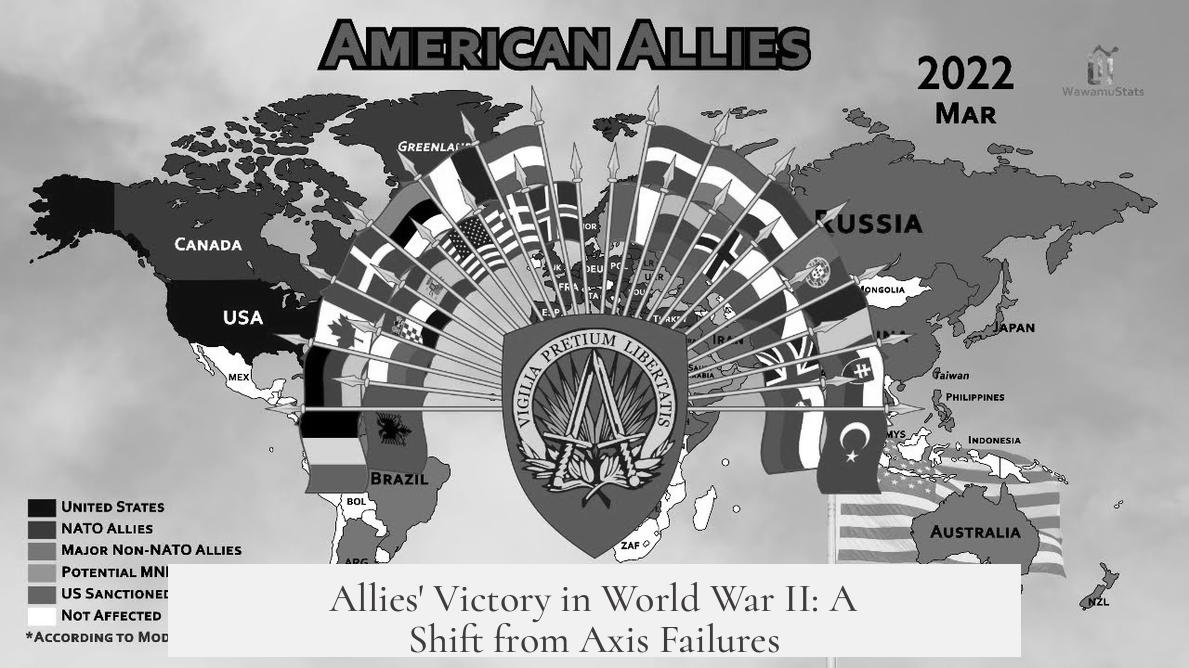The Allies won World War II, though the Axis powers ultimately lost due to unachievable goals and strategic errors. The war’s outcome reflects both the relentless Allied effort and the critical mistakes made by the Axis. The Allies not only reversed early Axis victories but leveraged overwhelming economic resources and manpower advantages to secure victory.
The Axis powers pursued unrealistic ambitions without feasible end goals. For example, if Hitler had confined his Eastern ambitions to Poland and Western borders to Vichy France, he might have forced Britain and the Soviet Union into separate peace treaties. Similarly, Italian and Japanese forces could have consolidated territorial gains in North Africa and Manchuria. Instead, Axis strategy focused on continuous territorial expansion with the flawed assumption of ultimate success. This attritional approach favored the Allies, whose industrial and agricultural bases were secure behind oceans, allowing uninterrupted war production and resource supply.
Hitler’s strategic errors compounded Axis failures. His micro-management, such as initiating the Blitz without neutralizing British airfields, allowed the Royal Air Force to maintain air superiority. This prevented the Germans from destroying the Royal Navy and stymied a potential successful invasion of Britain. The push toward Stalingrad, rather than focusing on less-defended Moscow or Leningrad, cost Germany highly trained troops and resources. By late war, Germany’s oil shortages crippled their mobility and military capacity, further limiting their strategic options.
The Allies’ strength lay not only in reversing early Axis gains but also in their economic and manpower advantages. By mid-1942, the Allies moved from defense to sustained offense, gradually reclaiming lost territories. The United States and Soviet Union became industrial powerhouses, producing massive quantities of weapons and supplies. This industrial capacity was a decisive factor. Simultaneously, the Allies had access to vast populations to replenish forces over prolonged conflict, contrasting with the Axis’s shrinking manpower pools.
The Soviet Union played a critical role, bearing immense casualties to blunt and then push back the German Wehrmacht on the Eastern Front. The Red Army absorbed the majority of German military might, suffering enormous losses but steadily rebuilding and replenishing its ranks. American Lend-Lease aid supplemented Soviet logistics and equipment, enabling deeper offensives. By the time the Western Allies launched Operation Overlord, Germany’s veteran forces were already depleted and worn from relentless Eastern battles, enabling a more decisive Allied advance in Western Europe.
In the Pacific, the United States decisively defeated Japan after brutal naval and land campaigns. The US Navy’s strength and industrial output underpinned a sustained island-hopping campaign that dismantled Japanese control. Although Japan could have sought peace while maintaining some conquered territories, it chose to continue fighting, ultimately leading to its unconditional surrender after atomic bombings and Soviet entry into the war against Japan.
The war’s conclusion was a total victory from the Allied perspective. The Axis recognized the conflict was unwinnable by 1943, with mounting losses and dwindling resources. Allied victory was driven by a combination of strategic patience, economic superiority, battlefield sacrifices, especially on the Eastern Front, and decisive military campaigns across multiple theaters.
Key takeaways:
- The Allies won World War II through sustained military effort and economic superiority.
- The Axis lost due to unachievable goals and critical strategic errors.
- The Soviet Union’s massive sacrifices and resilience were decisive against Germany on the Eastern Front.
- US industrial and naval power ensured victory in the Pacific.
- Hitler’s and Axis leadership mistakes hastened their defeat.
- Japan’s refusal to negotiate peace prolonged the Pacific War until total defeat.
Did the Allies Win World War II, or Did the Axis Just Lose?

Answering this question right off the bat: The Allies won World War II because they had achievable goals, economic might, and strategic strengths, while the Axis powers lost mainly due to fatal strategic errors, poor planning, and unrealistic ambitions. It’s a classic case of “victory” versus “inevitable defeat.” But the story is richer and more complicated. Ready to unpack it?
Think of World War II as a giant chess game—except with millions of lives and entire nations at stake. The Axis powers (Germany, Italy, Japan) started strong, racking up impressive victories. Yet, in hindsight, their “game plan” was a bit like trying to juggle chainsaws blindfolded—ambitious but perilous.
Axis Goals: Dreaming Big Without a Plan
The Axis lost because they set sky-high goals that weren’t achievable. Imagine if Hitler had settled for a “modest” border in Eastern Europe, say Poland to the East and Vichy France to the West. He might have pressured the English and Soviets into separate peace deals, splitting the Allies. Italy could have held sway over North Africa, and Japan might have maintained control in Manchuria.
Instead, all Axis powers chose a relentless march forward—a war of attrition. This approach meant “fight until everyone is exhausted.” Here’s the kicker: attrition favors whoever can keep producing soldiers and weapons. Spoiler alert—the Allies had that edge in spades.
Hitler himself didn’t help. He insisted on risky military blunders, like starting the Blitz but failing to target British airfields directly. This oversight let the Royal Air Force regroup and kept Britain’s defenses intact. Plus, attacking Stalingrad head-on instead of pressing the relatively weak defenses of Moscow or Saint Petersburg was a costly miscalculation.
And then there’s the growing oil shortage for Germany. War machines need fuel. Without it, even the most aggressive plans stall. Those blunders and shortages paint a clear picture: the Axis shot themselves in the foot repeatedly.
Allies: A World-Class Comeback Story
The Allies had a rocky start. Axis forces seemed unstoppable until mid-1942, racking victories like a video game pro. But then the tide shifted dramatically.
How? It boiled down to numbers and resources. The Allies commanded a massive economic advantage. The United States and Soviet Union, in particular, were like factories on steroids—producing weapons, tanks, planes, and supplies nonstop. The staggering industrial output outmatched Axis production by a huge margin.
Manpower also played a critical role. The Allies drew from larger populations and colonies, steadily replacing losses. This allowed them to grind down Axis forces over time—a war of endurance where “outlasting” became the winning strategy.
The Soviet Union: The Unsung Heavy Lifter
No discussion of the Allies’ victory is complete without spotlighting the Soviet Union’s massive contribution.
The Eastern Front was brutal. The Soviets suffered enormous casualties, constantly rebuilding shattered armies and rearming themselves. They fought fiercely, wearing down the best of the German Wehrmacht.
By the time the Western Allies launched Operation Overlord (D-Day), the German military was already a shadow of its former self, battered primarily by relentless Soviet pressure. Their best-trained soldiers were gone, and vital equipment lost. The Soviets arguably carried the heaviest load in the struggle against Hitler’s forces.
Japan: A Missed Peace Opportunity

Meanwhile, Japan had a chance for a peace settlement, holding onto Korea and parts of the South Pacific while maintaining conquered territories. Instead, they chose to keep fighting. This decision delayed peace and eventually led to devastating consequences for them—dropping atomic bombs and full-scale defeat.
So, did the Allies win, or did the Axis lose? The answer depends on the lens you use. From the Allies’ perspective, the victory was total and decisive. From the Axis viewpoint, defeat was foreseeable by 1943 at the latest—their ambitions and strategies doomed them to failure.
Practical Takeaways: What This Teaches Us
- Set achievable goals: If your aims are impossible, no matter how much effort you put in, you will likely fail.
- Plan strategically: Success demands smart resource management and realistic tactics.
- Leverage strengths: Massive production capabilities and manpower will outlast short-term victories.
- Adapt and learn: The Allies’ ability to recover from initial setbacks shows the power of resilience.
- Recognize when to negotiate: Japan’s refusal to settle illustrates the cost of stubbornness in conflict.
Final Thoughts
Did the Allies win World War II? Absolutely. They marshaled overwhelming resources, forged powerful alliances, and learned from early defeats to deliver a crushing blow to the Axis powers.
But the truth lives in shades of grey too. The Axis powers didn’t simply roll over. Their initial successes showed military might and daring but, ultimately, their strategic mistakes, overambition, and depleted resources unraveled their cause.
So, maybe it is both: The Allies won by capitalizing on strengths, and the Axis lost because they saddled themselves with unreachable goals. What’s your take? Could the Axis have done anything different to win, or was their fate sealed by their own decisions from the start?
Did the Allies win World War II because they were stronger, or did the Axis lose due to their mistakes?
The Allies won by using their economic and manpower advantages. The Axis powers made critical strategic errors, lacked achievable goals, and overextended their forces, which led to their eventual defeat.
How important was the Soviet contribution to the Allied victory?
The Soviet Union bore heavy losses and played a key role on the eastern front. Their forces wore down Germany’s best troops before the Western Allies fully engaged, making their effort crucial to the overall victory.
Could the Axis powers have avoided defeat if they had different strategies?
Yes. If Axis leaders had set achievable goals and avoided overambitious campaigns like the drive on Stalingrad, they might have forced separate peace deals, significantly altering the war’s outcome.
Did Japan have a chance to end the war without total defeat?
Japan could have negotiated a peace settlement while holding some territories. However, their choice to continue fighting eliminated this possibility, leading to their unconditional surrender.
From the Allies’ point of view, was the victory in World War II complete?
The Allies viewed the victory as total and decisive. They reversed early Axis gains and ended the conflict by defeating all Axis powers, securing a clear and final outcome.




